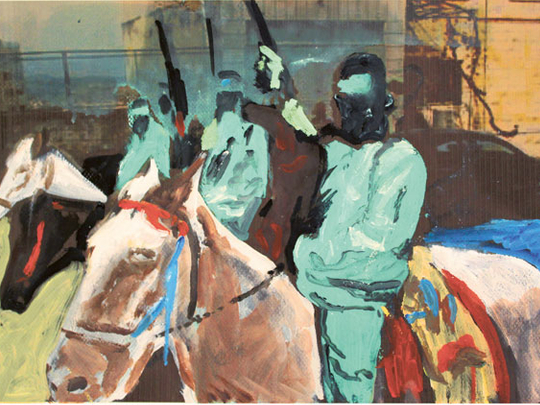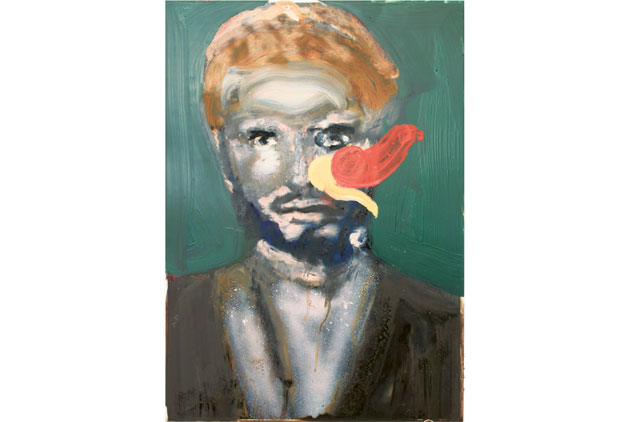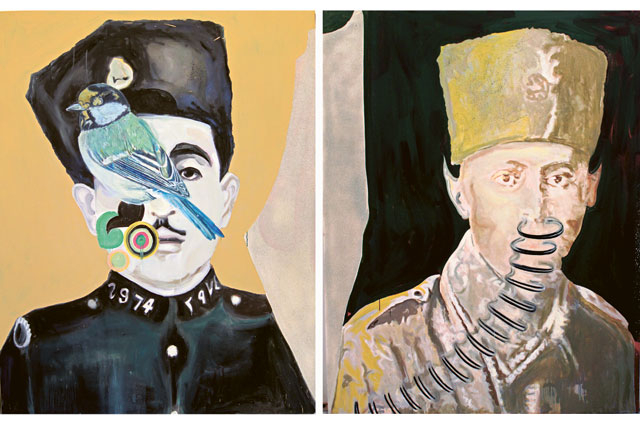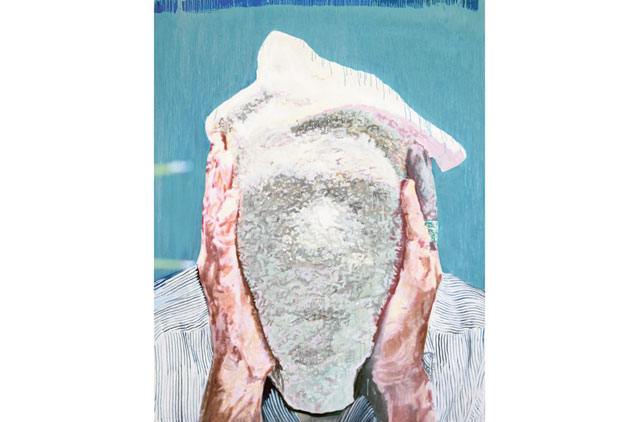
Jeffar Khaldi's fourth solo exhibition in Dubai, comprising portraits of himself, his family and various public figures connected with the conflict in Palestine, is essentially a journey into the past to explore his own identity. The Palestinian artist was born and raised in Lebanon. He went to the United States to study architecture and interior design and lived in Dallas for many years before moving to Dubai in 1995. He traces this journey through paintings of key moments and influences in his life, interspersed with depictions of people and events that influenced the course of the Palestinian struggle.
Laced with nostalgia, emotions and wry humour, Khaldi's oil paintings and collages question widely accepted perceptions and present his own perspective on various issues and people.
But his aim is not to force his opinions on others. Rather, as the title of this series, Remove the Invisible Blindfold, suggests, he wants to provoke and encourage viewers to form their own opinions by thinking objectively about the historical and contemporary socio-political issues that shape our lives and will affect our future.
"I am not a political artist but I believe that art must have depth and meaning and should make people think. This work is not just about me and the history of my homeland. It is about making people aware of the past so that we can learn from it and not allow anybody to take advantage of our ignorance.
"I am sceptical about anything I see or hear in the media. I prefer to do my own research to understand the circumstances and motives behind the actions of people and their consequences before labelling them as heroes, terrorists or freedom fighters. I feel that biased and manipulative media reports are like an invisible blindfold that prevent us from seeing the truth. And I want to tell people to remove this blindfold, question everything and make their own informed judgments," Khaldi says.
The artist researched old newspapers, magazines and newsreels to find photographs of various people and incidents he wanted to paint. But he presents these familiar media images with his own surreal twist. For instance, a painting of Menachem Begin and Anwar Sadat has a cockroach perched on Sadat's shoulder and shows both men with pointed, Mr Spock-like ears. It is titled Cockroaches in Disguise. Another work, titled Wipe Out, depicting Moshe Dayan and his air force chief relaxing after the Six Day War shows Dayan with a Hitler moustache and hat. Khaldi also pays tribute to his heroes such as Nasser, Gandhi, Tito, Khomeini, Arafat and even Carlos the Jackal for their support to the Palestinians.
He also makes us think about diverse issues, ranging from the circumstances that move ordinary people to give up their lives for a cause to the still-unexplained motives of Robert Kennedy's Arab assassin.
Often, his personal story is intertwined with the history of Palestine — such as a diptych that features portraits of his grandfather and Moshe Dayan, both wearing the uniform of the Ottoman police force.
"They were both in the police force at the same time and their paths must have crossed. But one went on to become an Israeli leader and the other ended up as a refugee," he says. Again, Khaldi makes his opinion quite clear with painful clamps piercing Dayan's face.
Another emotional painting, titled Last Cigarette, refers to the assassination of Palestinian poet and editor, Ghassan Kanafani, which Khaldi witnessed in childhood.
"Kanafani was our neighbour in Beirut and I was always impressed by his smart Alfa Romeo car. I can never forget the moment when I heard the bomb blast and saw his body being carried out of the car right outside our building. His assassins wrongly accused him of masterminding Tel Aviv's Lod airport massacre but he was killed because they felt threatened by the growing influence of his writings. The assassination, the story of the Lod massacre and its political fall-out, and the young Japanese-born attackers involved in the massacre who were willing to give up their life for the Palestinian cause have left a deep impression on my mind," Khaldi says.
The artist's journey has also been full of struggle. But his self-portraits suggest he has taken it all in his stride, with good humour and optimism. For instance, his portrait as a baby shows him smiling despite a vise, symbolising the pain that has been part of his life, clamped to his head. Another painting recalls the moment when he lost most of his work and possessions in a fire in his Dallas studio. But it shows him as a smiling, smartly dressed teenager standing beside his truck with the blazing studio in the background. "It was a life-changing moment and made me decide to move to Dubai, which has turned out to be a great place for an artist," Khaldi says. "This exploration has helped me get rid of a lot of mental baggage. But this journey is not about me as a Palestinian. It is about me as a human being trying to get people's attention about what is right and wrong," he adds.
Remove the Invisible Blindfold will run at Gallery Isabelle van den Eynde until February 10.














